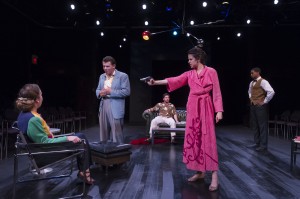“The Whitmores,” a macabre comedy at the intersection of race, wealth and privilege, ushered in the 18th season of the Boston University Fall Fringe Festival with performances at BU’s Huntington Theatre from Oct. 8 to 11. Written by College of Fine Arts senior Ben Ducoff, the play melts the sugar coating off of fragile social commentary, exposing the audience to raw sound bites and unfiltered discord.

Set in the living room of a screwball couple’s home in the suburbs of Cleveland, Tom and Mary Whitmore are intent on settling the score with the management at their private community following a failed effort to obtain a building permit for an addition on their home. The ill-fated targets of the Whitmores’ ire are Sue McGovern, the prim and proper president of the Bear Estates Homeowner Association, and her spoilsport husband, Frank — a duo characterized by Tom as “pure evil.”
The Whitmores concoct an elaborate dinner-turned-murder, inviting the unassuming twosome over for a birthday celebration they hope will ultimately lead to both of their untimely deaths. The Whitmores intend to inspire the caterer, Dale, a former mob assassin, to kill again by offering him his annual salary in exchange for carrying out the job.
Tom Whitmore, played by Ben Salus, a junior in CFA, carries the show with convivial enthusiasm, his repeated brushes with brashness easily forgiven. Tom’s forceful overtures encouraging guests to drink and loosen up become all too familiar throughout the play, and like a greasy salesman, he attempts to revive Dale’s murderous nature with frank conversation about his salary and the class lines he hasn’t been able to cross because he’s black. Dale remains obstinate and firm about his life as a changed man, but the crazed and determined Whitmores are deaf to his persistent repudiation. But it’s nothing a few gin and sodas can’t fix.
Dale, played by Harrison Meacham, a senior in CFA, delivers largely uninspired and terse lines of rejection through much of the performance, but awakens after shooting Frank in the foot following one of Tom’s tirades designed to intensify Dale’s appetite for power and control, delivering a powerful monologue. The ill-fated Frank doesn’t last much longer after he sets off Dale’s agitation around the economic gap by mentioning the American dream.
With Frank dead, the crusade against the McGoverns continues as Tom calls for putting someone like Dale, who’s gotten “the shit end of the stick their entire lives,” in charge. Mary expounds on “the tide of change” and imagines Dale’s acceptance speech as the new president of the Bear Estates Homeowner Association. During these scenes, it is difficult not to draw strong parallels between the play and Barack Obama’s ascent to the presidency.
Suddenly, Sue is shot in a swirl of artistic chaos — a ballet of skipping, tripping, bottle throwing and gun slinging. Within the pandemonium, Tom ends up shooting Sue, warning Dale he will only receive half the money for the job. A noticeably enraged Dale finishes the job, sealing his future and ensuring his full payment.
Dale assumes the position of president of the Bear Estates Homeowner Association, and it seems everything has gone according to plan. But much to the dismay of the Whitmores, their recent proposal to set up mailboxes in the shape of animals has not gone through. Confronting Dale leads them to the foregone conclusion of accepting the outcome, to which Tom responds, “So much for the fucking revolution.”
In the final scene, Tom and Mary invite Dale over for dinner, their malevolent leers not lost on the audience.
“The Whitmores” is highly entertaining, which is a feat made more ambitious considering the entire production included only five characters and no set changes. Reliant on dialogue and acting alone and accompanied only by a few crashes and flashes of thunder and lightning, the acting was solid enough to see the performance through.
Salus shines, perhaps more brightly overall than his counterparts. Mary, played by Lucy Farmer, a junior in CFA, is a lively and enjoyable compliment to Tom, despite occasionally delivering lines with ear splitting intensity.
When the play heads in one direction, it then veers in the other, keeping the audience on their toes as to the playwright’s ultimate message. Just as you become acquainted with one side’s motive, another is presented to defy it, demanding that the audience confront the basis of their arguments. The end is especially electrifying, debunking all of society’s failures and hinging on an anarchistic view of the world. Ducoff is a gifted playwright who will surely ruffle audiences for a long time to come.














